
This isn’t Canada, eh?
The times Americans thought I was crazy
Born and raised in Canada, I wasn’t expecting a big societal change coming to MIT for grad school. In my mind, Canada and the US had essentially the same culture.
But in this post, I wanted to share some of my experiences in the US that left me deeply confused. This isn’t going to be about the differences that everyone talks about, like how certain words are spelled differently, or how everyone thinks water freezes at 32 degrees instead of 0. These are some of the more subtle differences, things that you’d never think about until it happens and you end up feeling slightly awkward and out of place. If you’re Canadian, I hope you can relate. If you’re not, then you can laugh at all of us from the Great White North.
Restaurant Burglars, Tipping, and Tapping
Before Covid, I would sometimes go to a restaurant with friends to have a nice relaxing dinner. The waiter comes and brings the bill, so I take out my credit card to pay. And then the waiter takes it… and leaves?! I’d immediately start to panic. What if they lost them on the way back or accidentally gave them back to the wrong table? Or what if they charged the wrong amount, and I wouldn’t find out until I check my bank statement?
When the waiter comes back with my card, I can finally breathe a sigh of relief. But then comes the next unexpected part: tipping. In the US, you have to physically write down your tip with a pen and do the addition. Back home, we don’t have to do first grade math problems during dinner. Instead, the waiter would hand you a machine where you directly enter the tip amount and tap your card to pay.
I learned the hard way that the ‘tap to pay’ thing is also not something that’s done in the US, or at least until recently. A few years ago, I walked up to the cashier in an American store and put my Canadian credit card face down on the machine. Nothing happened. The cashier glanced up at me with a what-the-hell-are-you-doing expression and told me to insert my card and follow the instructions. It turns out tap wasn’t an option. Luckily, at the time I’m writing this, most stores have finally implemented tap, just in time to make safer transactions during the pandemic.
High-Res Conversations about Mark
At the beginning of grad school, there is usually some sort of department welcome session where the sole objective in everyone’s minds is to meet as many people as possible. The same questions get repeated over and over. Where are you from, what is your research on, and where are you living? During my welcome session, I casually asked someone what I thought was the most generic question.
“Are you living on res?”
I got a weird look in response, so I thought maybe she just didn’t hear me properly. So I repeated,
“Res… residence?”
“Oh, you mean like a dorm?”
Isn’t that the same thing? Guess not. Seeing that she was probably laughing on the inside at the ridiculousness of “res”, I made a mental note to myself to use “dorm” whenever I’m on American soil.
With the American and Canadian accents being so similar, speaking “in an American way” is not something I usually go out of my way to do. Or at least, until this happened a second time.
Later that first semester, my friend and I were having a discussion about one of our classes, and I said something along the lines of, “I guess we’ll have to wait for them to mark our exam.” He suddenly started talking about this guy named Mark and asked why I brought him up. Confused, I asked him who he was talking about and why he changed the subject so abruptly. It turns out that “grading” an exam means giving it a percentage or letter grade, whereas “marking” apparently suggests making random marks or scribbles on the paper. Who knew there’d be such a big language barrier separating our people?
Embracing Cultures
While Canada is definitely much more similar to the US than Asia or Europe, there are still many differences that are jarring when you encounter them for the first time, no matter how subtle they may be. It’s interesting to notice these differences because that’s what makes us unique, either as Canadians or as Americans. I’ve started to embrace both cultures during my time at MIT, because it’s important to learn to integrate into the new society while at the same time keeping in touch with your own background.
This story was originally posted on MIT Grad Admissions Blog.

